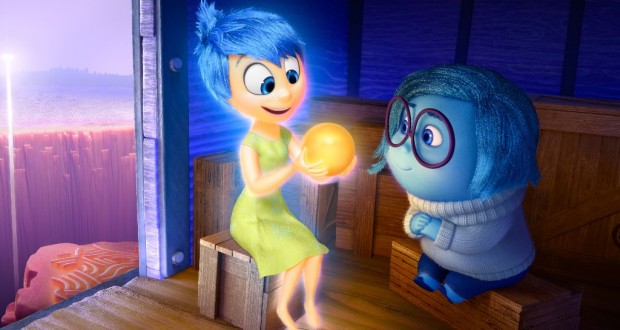SPOILER ALERT: The following article contains spoilers for the Disney Pixar animation Inside Out.
Disney Pixar’s latest animation feature Inside Out offers purpose to all personified emotions, addressing the guilt and shame of Sadness. Ashley Thompson writes.
Critically acclaimed for offering a “strikingly intricate and satisfying conceptualisation of a pre-teen’s psyche”, Director Pete Docter’s candy-coloured visual bonanza Inside Out explores the ordinary trauma of 11-year-old Riley’s upheaval from her familiar Midwest American life to big city living.
Meet Joy (Amy Poehler), Sadness (Phyllis Smith), Anger (Lewis Black), Disgust (Mindy Kaling) and Fear (Bill Hader). Like us all, Riley is guided by these emotions as they advise her through everyday life from Headquarters.
Joy calls the shots but when the turmoil of adjusting to Riley’s new life in San Francisco ensues, she is forced to rely on the other emotions including Sadness, with whom she struggles to understand.
Like a misguided friend trying to help another through depression, Joy spends most of her time either ignoring Sadness or trying to fix her, using unhelpful phrases such as “think positive!” and “we can’t focus on what’s going wrong, there’s always a way to turn things around!”
While these phrases might sound helpful on the surface, to someone who is perpetually sad they are a frustrating reminder not everyone sees their illness as legitimate but simply a fleeting sentiment easily cured by ice cream and pep talks.
Christian communities are often one the hardest places to be for people experiencing sadness, as the upbeat nature of Sunday worship often implies emotions other than joy aren’t welcome because sadness reflects a spiritual weakness or lack of faith.
Meanwhile statistics from the Mental Health Council of Australia show that around 45 per cent of Australians will have a mental health disorder at some time in their lives, most commonly depression and anxiety.
Throughout the film, Joy begins to realise Sadness too plays an important role in Riley growing up, remembering it was Sadness not her that inspired friends and family to comfort Riley and lift her up during a hard time.
“Sadness … Mom and Dad … the team. They came to help… because of Sadness,” realises Joy.
This torrent of sentimentality, wisdom and understanding makes Inside Out an animation film that transcends age. It highlights factors that people suffering from depression find most helpful: that Sadness should not be ignored but continually believed in, listened to and understood.
It is OK to be sad; because only with a full spectrum of emotion can we carry out God’s purpose in our lives.
If you should ever need to talk to someone about your own or another’s mental health, call Lifeline on 13 11 14.
 JourneyOnline
JourneyOnline







